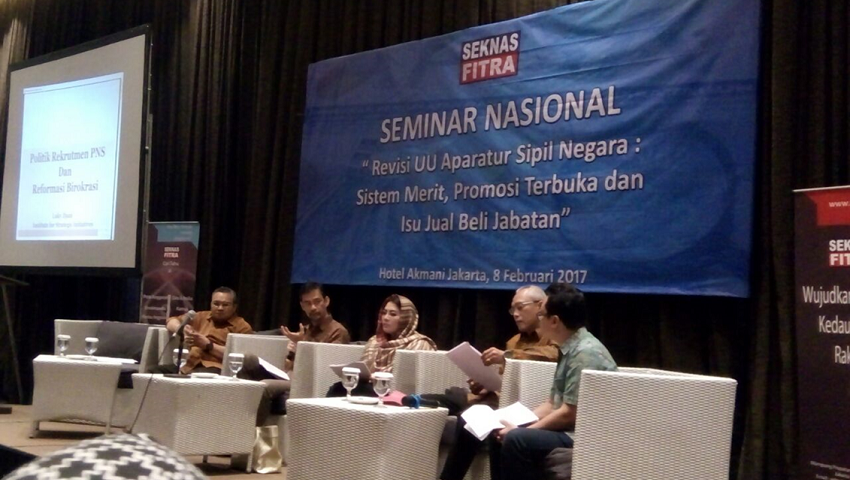by Iskhak Fatonie
“Even within the internal bureaucracy, some bureaucrats are not happy with the implementation of UU ASN, especially the meritocracy and open promotion system for Senior Executive Services (Jabatan Pimpinan Tinggi, JPT). They prefer to be in their comfort zone rather than in a competitive zone.” Robert Endi Jaweng, KPPOD.
As part of a series of advocacy events to discuss the possible revision of the 2014 Law on Civil Service (UU Aparatur Sipil Negara, or ASN) with special attention on merit-based recruitment and open promotion, FITRA (Indonesian Forum for Transparency of Budgets) with the support of KSI organised a half-day national seminar on 8 February 2017 at the Akmani Hotel. Speakers included Arief Wibowo from the National Parliament, Yenny Sucipto from FITRA, Robert Endi Jaweng from KPPOD, and Luky Djani from the Institute for Strategic Initiatives (ISI). Professor Siti Zuhro from the Independent Team for Bureaucratic Reform (TI-RBN) and Waluyo from the National Civil Service Commission (KASN) were members of the discussion. More than 70 participants attended from line ministries, CSOs, NGOs, media, universities and associations of policy analysts, as well as contract-based government employees.
Ms. Yenny Sucipto, Secretary General of FITRA, presented the FITRA study on budget expenditure of civil servants at national and sub-national levels, where many provinces and districts allocate expenditure mostly for government salaries. This creates poor government performance in public service delivery and infrastructure facilities. If the proposed revision of the UU ASN would mandate the conversion of more than 500,000 additional contract-based government employees (tenaga honorer) into civil servants (pegawai negeri sipil) without competency tests, it would become a very heavy additional burden on national and regional budget expenditures. Endi Jaweng outlined an alternative strategy for the conversion of tenaga honorer that had two solutions: the termination of the contract of ‘honorer’ through ‘golden handshakes’ or with a significant severance package; and the conversion of selected ‘honorer’ through competency testing. He referred to the most recent KPPOD study on, ‘Tata Kelola Ekonomi Daerah 2016’ (Regional Economic Governance 2016) launched last month. It found that if civil servants had limited competency, this often led to poor public service delivery and economic development.
Ms. Yenny Sucipto, Secretary General of FITRA, presented the FITRA study on budget expenditure of civil servants at national and sub-national levels, where many provinces and districts allocate expenditure mostly for government salaries. This creates poor government performance in public service delivery and infrastructure facilities. If the proposed revision of the UU ASN would mandate the conversion of more than 500,000 additional contract-based government employees (tenaga honorer) into civil servants (pegawai negeri sipil) without competency tests, it would become a very heavy additional burden on national and regional budget expenditures. Endi Jaweng outlined an alternative strategy for the conversion of tenaga honorer that had two solutions: the termination of the contract of ‘honorer’ through ‘golden handshakes’ or with a significant severance package; and the conversion of selected ‘honorer’ through competency testing. He referred to the most recent KPPOD study on, ‘Tata Kelola Ekonomi Daerah 2016’ (Regional Economic Governance 2016) launched last month. It found that if civil servants had limited competency, this often led to poor public service delivery and economic development.
Adding to the complexity, Luky Djani said the status of civil servants in most areas in Indonesia was very prestigious and part of the so-called ‘highest social status/elit daerah’. Therefore, ‘contract honorers’ are very eager to be converted into full civil servants. He also said strategic high-level civil servants at ministries and local governments could be appointed in line with the five-year political cycle or through a political appointee mechanism, just like ministers. Thus bureaucrats would deliver the President’s vision and mission in a proper and timely manner.
As the initiator of the revision of UU ASN, Arief Wibowo – PDI-P member of parliament, said KASN might need to be abolished, as other similar institutions already exist within the Government, with supervisory and monitoring roles, such as the Ombudsman, BPK, BPKP and ministerial inspectorate-general. However, he and others from DPR-RI still have some flexibility to discuss the KASN abolishment. He also echoed the main rationales of the revision of UU ASN which are: 1) to accommodate the status of ‘honorer’ to the upcoming revised UU ASN: direct conversion to PNS and recognition of ‘honorer’ by the state, and 2) to strengthen and revitalise the monitoring system through existing institutions for civil service apparatus.
Resource people from civil society argued that the UU ASN does not need revision. Rather, as a newly established government body, KASN’s role in supervising and monitoring the implementation of meritocracy and the open promotion system needs to be strengthened. This system could minimise improper placement of senior executive services (isu jual beli jabatan) by top leaders at national and sub-national level. They disagreed with the idea of a direct conversion of ‘honorer’ to PNS, saying all ‘honorer’ should be recruited through competency testing, not by default.
This national seminar was part of KSI’s commitment to facilitate improved interactions between policy makers (including Members of Parliament) and knowledge producers, such as universities, research institutes and civil society organisations for better policy making in Indonesia. This kind of facilitation is expected to lead to shared understanding and coalition building to achieve a healthy knowledge sector, in particular on merit-based recruitment, and promotion and remuneration of researchers and bureaucrats who are responsible for the policy-making process.






